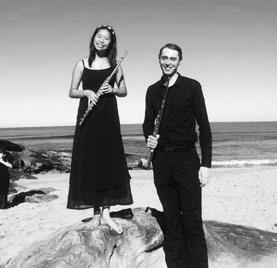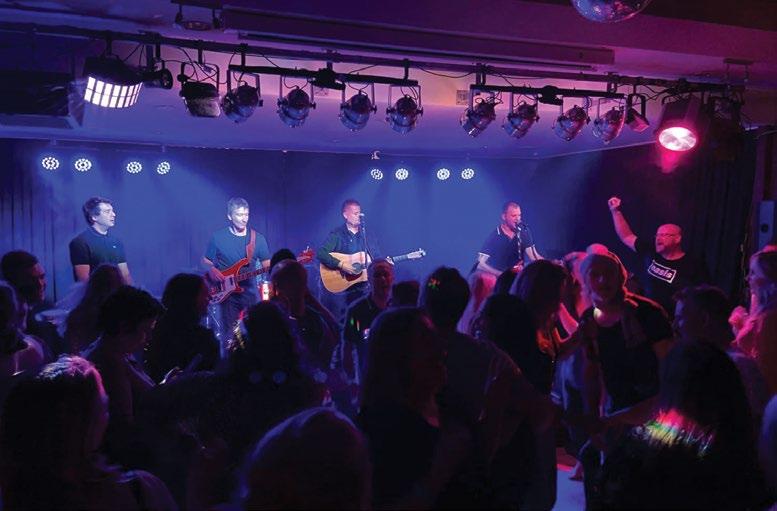
9 minute read
Beat and Drill
THE MUSICAL DENTISTS
Our members are well-known for pursuing artistic endeavours outside of the dental practice. It will come as no surprise, then, to discover that many are musical, as Brooke Evans-Butler discovers.

Dr Luke Chow
Orthodontist Luke Chow plays electric guitar, sings, and used to be a recording engineer/producer. “I’ve been playing in bands since I was 12 years’ old,” he says. “I started playing electric guitar at boarding school, after I quit the choir for rock n roll, however, I was made to take classical guitar lessons by the Head of Music as punishment. I then moved back to Hong Kong, where I did a singer-songwriter acoustic thing and got back into the electric.” Luke plays indie rock with band Kestrels and Kites, and says he uses music as a distraction from life stress in general. “When I was a general dentist, my hands would be quite tired at the end of the day, so would normally play on weekends,” he says. “I recommend thick, 50s-style guitar necks for less hand stress. “I play with my wife and it’s a nice escape from the children – it’s like we’re in our 20s again. I generally write the songs; I just make them up. I don’t have any formal music training; I play by ear.”
Kestrels and Kites kestrelsandkites.com facebook.com/KestrelsAndKites
Photographer: Steve Laue

Clinical Professor Bernard Koong
Many years ago, this highly experienced and internationally respected oral and maxillofacial radiologist was taking the stage as a vocalist and keyboardist with a covers band. Although he’s no longer centre stage, Bernard still finds time for song writing and electronic music production.
“I had classical piano training and also play a bit of self-taught guitar,” he says. “While I absolutely marvel at those with amazing technical skills, I very much enjoy the creativity in song writing and music production.” Bernard has interests in two genres – the singer/songwriter pop genre, which has a hint of 80s influences – and electronica/electronic dance music (EDM).
“I have very much been focusing on the latter in the last four or five years,” he says. “While I do enjoy writing a song for a singer-song writer/ band format, electronica gives me freedom on a whole different level. In electronica, the entire world is your orchestra; every sound that exists or that you can create is an instrument! “While clinical dentistry involves both art and science, there is absolutely no artistic expression in radiology! It’s all just shades of grey,” he says. “I’ve been playing and writing music since my teenage years, and it certainly engages a different part of my brain. This is particularly true of song writing, which engages the purely creative, emotional and expressive aspects of one’s brain over the technical elements of mastering an instrument.” “Finding this balance between the rigorous application of radiological skills and the opportunity to express myself creatively is really important to me. Having said that, recording and music production is largely done on a computer, so I do find myself sitting in front of one after a long day staring at a computer screen at the practice!” “The act of creating a piece of music – which essentially had not existed previously – gives me so much joy.” To check out Bernard’s current ongoing electronica project, go to
soundcloud.com/user-989860774/sets/bktracks/s-MZEy8BARjYU
To hear his song writing and vocals, head to
soundcloud.com/user-602378060/sets/onemore-time/s-TpMUcFZ7luP
for his “singer songwriter pop” EP recorded in 2017, with prosthodontist Glen Liddelow playing bass and co-producing. You may prefer to use the QR codes for these SoundCloud links instead. Bernard recommends using head/earphones or a hi-fi sound system for the best listening experience, especially for EDM/ electronica where “hearing the full range of frequencies is crucial to the tracks!”.
Dr Alisdair Wallace
Ali Wallace plays the drums for band Circle of Trust, playing covers, mostly with an 80s influence, but also covering tracks from the 50s up to current times. “I’ve been playing drums in a band for over 10 years,” Ali says. “I’ve played piano since we bought one for the kids and they never touched it. I’m not formally taught. YouTube is my teacher.
“Since then, I’ve been in and out of a few different bands, but stuck with mostly the same people from the start.” When asked if playing in the band is a way to express his artistic side, Ali laughs. “Artistic side? This makes me chuckle,” he says. “Playing covers is about reproducing popular sounds other more talented people have created. I don’t regard myself as creative. It is a wonderful way to de-stress and unwind from the day-to-day running of a busy practice. I always look forward to my weekly rehearsal night. “Most importantly, we do it for fun,” he adds. “We play a combination of gigs for fun and for fundraising, with the odd paid performance. We do enough paid work to buy new PA equipment every now and then.”
Circle of Trust circleoftrust.band facebook.com/circleoftrustoz
Dr Lyndon Abbott
Lyndon started playing the flute when he was 10, going on to study a Bachelor of Music (Performance) at the Sydney Conservatorium of Music. During his DMD studies (2016-19), he was the principal flute in the WAYO (West Australian Youth Orchestra), WACO (West Australian Charity Orchestra) and Western Australian Wind Symphony. “During my music degree (2012-2015), Sydney University asked me to tour around NSW as a soloist,” Lyndon says. “I played in the Sydney Conservatorium of Music Orchestra and was even filmed playing the flute on an episode of The Bachelor on Channel 10.” Lyndon says, currently, playing is his outlet after a day in the clinic. “I see it as a way to use a completely different part of my brain. It’s my way of communicating things I can’t say in words. Playing is a way I can forget about all the stresses from that day. “It’s also a discipline,” he adds. “Much as swimming laps is to a swimmer, playing scales and practising is the way I can keep my fingers agile and chops in check.”
Drs Sophia Hawes and Simon Tee
Sophia Hawes is the vocalist for the band, Fragments, with fellow dentist, Simon Tee, on drums. The band plays a mixture of jazz classics and rock-pop standards at community events and private functions. “I’ve been singing for as long as I can remember,” Sophia says. “I did classical voice training during school days and have always been involved in music. “I’d like to think that working as a dentist should not define you as an individual, and having interests outside of work is really important,” she says. “There’s a lot of hard work that goes into the rehearsals for a gig and that does help you switch off from work. There is no time to think or talk about dentistry when we’re busy rehearsing.
“Performing in a band and feeling the joy you bring to others when you perform in the community is something special.” Simon has played the piano since he was five, taking up drums at age 15. “Music for me has always been an escape from the daily grind,” he says. “As a dentist, it’s particularly nice to have a pleasant sound coming from your instruments for a change, instead of the usual scraping, hissing, and beeping noises we’re used to!”
Fragments
Contact Ron Banks
ron.banks@iinet.net.au
Lyndon playing in a chamber ensemble while at the Sydney Conservatorium of Music.




Dr Phil Robson
Phil Robson plays bass guitar for the band, The Parkas. “We’ve been playing gigs around the pubs and clubs in Perth and Fremantle for six months now, and we’re getting a bit of a following,” Phil says. “We play mainly Britpop/British indie covers from bands such as Oasis, Blur, Stone Roses, Radiohead, to name a few.” Phil first bought a bass when he was 16 and living in the UK; during dental school he found himself living with a couple of guys who played guitar. “This got me back playing again, but my progress was curtailed as I soon left the UK after graduating and went travelling with my best mate from dental school. We eventually made it to Sydney, where I bought an acoustic bass, and my mate bought a guitar, and we drove up to Cairns in our camper van. “Fortunately, we both ended up getting jobs at the same dental surgery in Townsville. We worked there for a year and a half, and I took some bass lessons. I feel like it was this period when I can actually say that I started playing bass.” He says a breakthrough for him occurred in 2016, when he attended an “interview” for his current job. “Upon hearing that I ‘played bass’, I was offered the job on the spot! My new boss (ADAWA member Dr Ben Campbell) was a keen guitarist too and within months of this new job we started up a band along with some others, including another ADAWA member, Ali Wallace. “We played a handful of gigs, mostly private parties and birthdays of people we knew. Then, after doing this for three years or so, I saw an online advert from a few guys looking to start a British indie/Britpop cover band and they needed the services of a bass player. As this is actually the genre of music that I grew up listening to, I jumped at the chance. “We’ve been playing together for two years now. We had a bit of a staggered start, what with COVID and bringing on board a new lead singer, but for the last six months we’ve been playing a number of gigs in the pubs and clubs around Perth and Fremantle.” Phil says, serendipitously, dentistry has placed him in the right place with the right people to give his musical
life a kickstart. “I’m also eternally thankfully of the free time that dentistry allows me to practise, rehearse, perform and therefore enjoy my music,” he says. “Over the years, playing my bass has become my go-to activity for my spare-time, especially now with the need to be often learning news songs for upcoming gigs or practising the current ones. “I even have a bass at the surgery to tinker with either in-between patients or at lunchtimes. I used to read a lot more in my spare time, but now, I prefer to play music.”
The Parkas facebook.com/theparkas
Lyndon playing in a chamber ensemble while at the Sydney











